Related Research Articles

James Joseph Heckman is a Nobel Prize winning American economist who is currently at the University of Chicago, where he is The Henry Schultz Distinguished Service Professor in Economics and the College; Professor at the Harris School of Public Policy; Director of the Center for the Economics of Human Development (CEHD); and Co-Director of Human Capital and Economic Opportunity (HCEO) Global Working Group. He is also Professor of Law at the Law School, a senior research fellow at the American Bar Foundation, and a research associate at the National Bureau of Economic Research. In 2000, Heckman shared the Nobel Memorial Prize in Economic Sciences with Daniel McFadden, for his pioneering work in econometrics and microeconomics. As of December 2020, according to RePEc, he is the second most influential economist in the world.
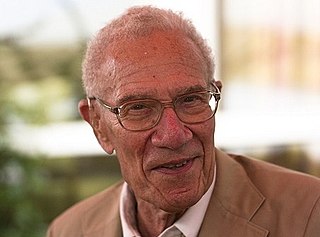
Robert Merton Solow, GCIH is an American economist whose work on the theory of economic growth culminated in the exogenous growth model named after him. He is currently Emeritus Institute Professor of Economics at the Massachusetts Institute of Technology, where he has been a professor since 1949. He was awarded the John Bates Clark Medal in 1961, the Nobel Memorial Prize in Economic Sciences in 1987, and the Presidential Medal of Freedom in 2014. Four of his PhD students, George Akerlof, Joseph Stiglitz, Peter Diamond and William Nordhaus later received Nobel Memorial Prizes in Economic Sciences in their own right.
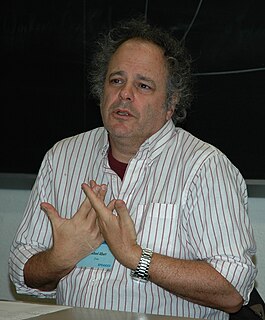
Michael Albert is an American economist, speaker, writer, and political critic. Since the late 1970s, he has published books, articles, and other contributions on a wide array of subjects. He has also set up his own media outfits, magazines, and podcasts. He is known for helping to develop the socioeconomic theory of participatory economics.

The Brookings Institution, often simply called Brookings, is an American research group founded in 1916 on Think Tank Row in Washington, D.C. It conducts research and education in the social sciences, primarily in economics, metropolitan policy, governance, foreign policy, global economy, and economic development. Its stated mission is to "provide innovative and practical recommendations that advance three broad goals: strengthen American democracy; foster the economic and social welfare, security and opportunity of all Americans; and secure a more open, safe, prosperous, and cooperative international system."
The Chicago school of economics is a neoclassical school of economic thought associated with the work of the faculty at the University of Chicago, some of whom have constructed and popularized its principles. Milton Friedman and George Stigler are considered the leading scholars of the Chicago school.
Philosophy, politics and economics, or politics, philosophy and economics (PPE), is an interdisciplinary undergraduate or postgraduate degree which combines study from three disciplines. The first institution to offer degrees in PPE was the University of Oxford in the 1920s. This particular course has produced a significant number of notable graduates such as Aung San Suu Kyi, Burmese politician and State Counsellor of Myanmar, Nobel Peace Prize winner; Princess Haya bint Hussein, daughter of the late King Hussein of Jordan; Christopher Hitchens, the British–American author and journalist; Oscar winning writer and director Florian Henckel von Donnersmarck; Philippa Foot and Michael Dummett, British philosophers; Harold Wilson, Edward Heath and David Cameron, former Prime Ministers of the United Kingdom; Hugh Gaitskell, William Hague and Ed Miliband, former Leaders of the Opposition; former Prime Minister of Pakistan Benazir Bhutto and current Prime Minister of Pakistan Imran Khan; and Malcolm Fraser, Bob Hawke and Tony Abbott, former Prime Ministers of Australia. The course received fresh attention in 2017, when Nobel Peace Prize winner Malala Yousafzai earned a place.
The Friedman rule is a monetary policy rule proposed by Milton Friedman. Essentially, Friedman advocated setting the nominal interest rate at zero. According to the logic of the Friedman rule, the opportunity cost of holding money faced by private agents should equal the social cost of creating additional fiat money. It is assumed that the marginal cost of creating additional money is zero. Therefore, nominal rates of interest should be zero. In practice, this means that the central bank should seek a rate of deflation equal to the real interest rate on government bonds and other safe assets, to make the nominal interest rate zero.

Sir Angus Stewart Deaton is a British-American economist and academic. Deaton is currently a Senior Scholar and the Dwight D. Eisenhower Professor of Economics and International Affairs Emeritus at the Princeton School of Public and International Affairs and the Economics Department at Princeton University. His research focuses primarily on poverty, inequality, health, wellbeing, and economic development.

Yi Gang is the Governor of the People's Bank of China since 2018. He is also the former Director of the State Administration of Foreign Exchange.
Celia Elizabeth (Betsy) Hoffman was Executive Vice President and Provost of Iowa State University from 2007-2012, where she remains as professor of economics. From 2000 to 2005, she was President of the University of Colorado System, where she is President Emerita. She is also a Senior Distinguished Fellow at the Searle Center on Law, Regulations, and Economic Growth at Northwestern University School of Law, and serves on numerous for-profit and non-profit Boards. She served on the National Science Board from 2002-2008. Her published research is in the areas of Experimental economics, Cliometrics, and Behavioral Economics.
Marianne A. Ferber was an American feminist economist and the author of many books and articles on the subject of women's work, the family, and the construction of gender. She held a Ph.D. from the University of Chicago.

Joel Mokyr is a Netherlands-born American-Israeli economic historian. He is a professor of economics and history at Northwestern University, where he has taught since 1974; in 1994 he was named the Robert H. Strotz Professor of Arts and Sciences. He is also a Sackler Professorial Fellow at the University of Tel Aviv's Eitan Berglas School of Economics.

The Regional Economics Applications Laboratory (REAL) at the University of Illinois at Urbana-Champaign is a regional science research center for advanced graduate students in the fields of economics, geography, urban and regional planning, computer science and mathematics. Professor Geoffrey J.D. Hewings, one of its founders, served as its director until 2016. Professor Sandy Dall'erba has been its director since 2016.
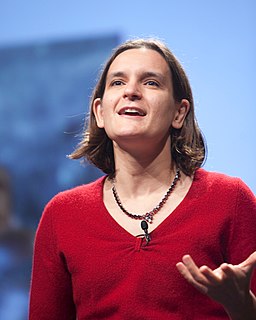
Esther Duflo, FBA is a French–American economist who is a professor of Poverty Alleviation and Development Economics at the Massachusetts Institute of Technology (MIT). She is the co-founder and co-director of the Abdul Latif Jameel Poverty Action Lab (J-PAL), which was established in 2003. She shared the 2019 Nobel Memorial Prize in Economic Sciences with Abhijit Banerjee and Michael Kremer, "for their experimental approach to alleviating global poverty".
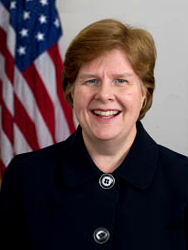
Christina Duckworth Romer is the Class of 1957 Garff B. Wilson Professor of Economics at the University of California, Berkeley and a former chair of the Council of Economic Advisers in the Obama administration. She resigned from her role on the Council of Economic Advisers on September 3, 2010.
In economics, the Laffer curve illustrates a theoretical relationship between rates of taxation and the resulting levels of the government's tax revenue. The Laffer curve assumes that no tax revenue is raised at the extreme tax rates of 0% and 100%, and that there is a tax rate between 0% and 100% that maximizes government tax revenue. The shape of the curve is a function of taxable income elasticity – i.e., taxable income changes in response to changes in the rate of taxation.
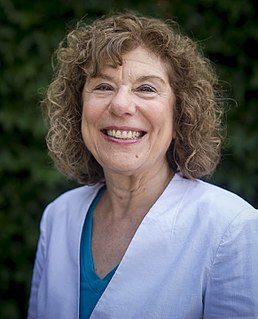
Francine Dee Blau is an American economist and professor of economics as well as Industrial and Labor Relations at Cornell University. In 2010, Blau was the first woman to receive the IZA Prize in Labor Economics for her "seminal contributions to the economic analysis of labor market inequality." She was awarded the 2017 Jacob Mincer Award by the Society of Labor Economists in recognition of lifetime of contributions to the field of labor economics.
Ernest Ludlow Bogart was an American economist. He was a professor of economics at the University of Illinois at Urbana–Champaign from 1909 to 1938. In 1931, he served as President of the American Economic Association.
Mark Daniel Bernhardt is an American-Canadian economist, focusing in industrial organization, finance and political economy, currently the IBE Distinguished Professor of Economics at University of Illinois. Bernhardt is also a Professor at the University of Warwick. Prior to being a professor at the University of Illinois, Bernhardt was a professor at Queen's University in Kingston, Ontario. While at Queen's University he was also the head coach of the wrestling team. Bernhardt graduated from Oberlin College in 1980 with degrees in Mathematics, and Economics. He was also on the school's wrestling team. At Oberlin, Bernhardt was roommates with country singer, Marc Cohn. After leaving Oberlin College, Bernhardt went on to get his PHD in Economics from Carnegie Mellon University in Pittsburgh, Pennsylvania. There, Bernhardt was classmates with current president and chief executive officer of the Federal Reserve Bank of Chicago, Charles L. Evans, and billionaire hedge-fund manager, David Tepper. In 1986, Bernhardt was the recipient of The Alexander Henderson Award for Excellence in Economic Theory. Bernhardt is a registered independent who consistently votes for Democratic candidates, however Bernhardt voted for Gerald Ford in the 1976 United States presidential election, and for Judy Baar Topinka in the 2006 Illinois gubernatorial election, both of whom were Republican candidates. Bernhardt is an outspoken critic of Donald Trump, and the Trump Administration. Bernhardt voted for Hillary Clinton in the 2016 United States presidential election, and then for Joe Biden in the 2020 United States presidential election, however, he originally supported Pete Buttigieg's candidacy in the 2020 Democratic Party primary election. Bernhardt is an opponent of both left and right-wing populism, and has criticized the populist policies of Bernie Sanders, Andrew Yang, and Tulsi Gabbard. Bernhardt didn't support a candidate for Prime Minister in the 2019 United Kingdom general election, however he said that Johnson was the better candidate, citing Corbyn's history of anti-Semitism, and ludacris economic policies as reasons to vote against Corbyn. Bernhardt is a major critic of Brexit. Bernhardt lives with his wife, Margaret, and the two of them have three sons: Robert, Michael, and Brian. Bernhardt is Jewish.

Mary C. Daly is an American economist, who became the 13th President and chief executive officer of the Federal Reserve Bank of San Francisco on October 1, 2018. Accordingly, she serves on the Federal Reserve's rate-setting Federal Open Market Committee on a rotating basis. Previously, Daly was the Executive Vice President and Director of Research of the Federal Reserve Bank of San Francisco, which she joined as an economist in 1996.
References
- ↑ "Firouz Gahvari". illinois.edu. Retrieved May 13, 2017.
- ↑ "Firouz Gahvari". illinois.edu. Retrieved May 13, 2017.
- ↑ "Firouz Gahvari". illinois.edu. Retrieved May 13, 2017.